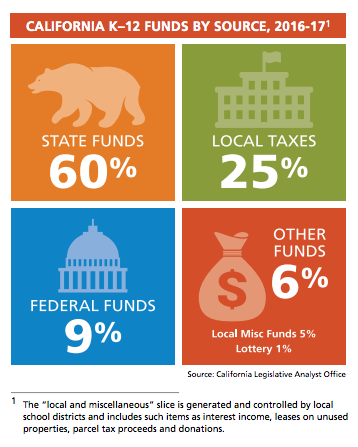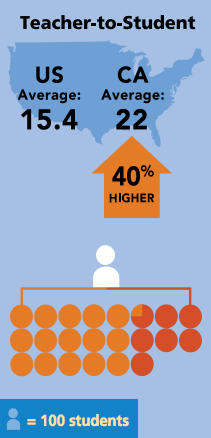What Every School Board Candidate Should Know About Money

Education and Money
As we head into the final weeks before the election, education issues, as always, are at the forefront of many parents’ minds.
 Molly McGee Hewitt
Molly McGee HewittIt’s important that voters and candidates alike are as informed as possible about the key issues we face.
And this year, perhaps no issue is more relevant than school finance. It doesn’t sound like a sexy issue or a hot-button issue, but California’s school finance system fuels the learning and developmental opportunities that our state’s 6.2 million public school students receive.
The system is driven largely by decisions made by our state and local leaders. And that system isn’t always so easily understood. There are a lot of components to it, and many important challenges and trends to be aware of. Decisions made today have affect what happens in our classrooms next month and for years to come.
A Timely New Guide on School Finance
The California Association of School Business Officials (CASBO) has a new guide that can help. School Finance and Business in California: What Every Board Member and Candidate Should Know identifies important “must know” research, statistics and issues for school board members and candidates.
It includes the basics about school district budgeting, the state’s local control school funding formula, school finance statistics, and current issues and trends. While sometimes less visible, these are crucial to supporting the success of our students every day in all of our classrooms.
Share this guide with your school board and school board candidates
Our goal in making this guide available is to help everyone in the school community — parents and families, educators, board members, student leaders, etc. — think about and discuss critical school issues from a common set of facts and data. This is especially valuable at election time, when we expect parents to provide input and candidates to share their views.
Start the Conversation
Along with Ed100’s chapter on school finance, you can use this guide to help start and frame conversations at a candidates forum or an informal get-together. This helps raise the profile of the importance of school finance, and it helps build understanding about the challenges and choices your local district faces.
Some big-picture questions and discussion topics are included below. (Don’t worry: You'll find the answers in this guide and also in Ed100.)
Big-Picture Questions About School Funding |
|---|
What are the main sources of funding for public schools? |
How is the amount of money schools get in the state budget determined? |
How stable is the state’s funding? |
How are the costs for building new school facilities or modernizing existing ones paid for? |
How much on average does California spend per student? How does this compare to other states? |
What percentage of California’s taxable income is spent on education? |
About how much more money is needed to ensure our students have the opportunity to reach their education goals? |
How does the Local Control Funding Formula work?
- Do all school districts get the same amount of money?
- How much flexibility do school districts actually have to spend the funds they receive from the state?
- What are California’s education priorities ?
What are the big issues in your school district budget?
(Warning: This gets into a little more detail but for good reason. Your school board makes budget decisions.)
- What are the main expenditures in your school district budget?
- What factors impact a local budget?
- What are the main challenges in balancing the budget and maximizing the funding available for student support and services?
- How significant are rising pension costs on the school district budget?
- What about the impact of increased expenses for serving students with disabilities?
- Who oversees the school district budget?
- What are the three major “certifications” of a district budget?
School finance and business operations are critical for serving our students and communities. While often behind the scenes, they don’t have to seem mysterious.
|
Budget and LCAP Calendar for School Boards |
|
|---|---|
|
November/December |
Develop expenditure projections. Reflect on current LCAP goals and progress. |
|
January |
Governor releases state budget proposal. Begin seeking input to update LCAP. Present preliminary budget to Board. |
|
February |
Governing Board establishes priorities. |
|
March/April |
Input on LCAP by stakeholders and required committees. Budget committee reviews budget priorities for inclusion in proposed budget. |
|
May/June |
Revise revenue projections based on Governor’s “May Revise” budget. Budget and LCAP made available to public. |
|
Late May/Early June |
Concurrent public hearing on LCAP and budget. |
|
On or before July 1 |
Adopt LCAP and budget. |
|
September/October |
Review and notification by county superintendent. |
The more that parents and school leaders can have a common understanding and talk together about these issues (and the data and research behind them), the better results ultimately for our students.
 Molly McGee Hewitt is CEO and Executive Director of the California Association of School Business Officials (CASBO), which supports public schools and school leaders in California by providing professional training and creating opportunities for collaboration in every facet of school business management and operations. CASBO represents 23,000 school business officials in all K-14 business disciplines, from Chief Business Officers to Technology, Human Resources, Facilities and Nutritional Services Directors, and more.
Molly McGee Hewitt is CEO and Executive Director of the California Association of School Business Officials (CASBO), which supports public schools and school leaders in California by providing professional training and creating opportunities for collaboration in every facet of school business management and operations. CASBO represents 23,000 school business officials in all K-14 business disciplines, from Chief Business Officers to Technology, Human Resources, Facilities and Nutritional Services Directors, and more.Tags on this post
Funding Local controlAll Tags
A-G requirements Absences Accountability Accreditation Achievement gap Administrators After school Algebra API Arts Assessment At-risk students Attendance Beacon links Bilingual education Bonds Brain Brown Act Budgets Bullying Burbank Business Career Carol Dweck Categorical funds Certification CHAMP Change Character Education Chart Charter schools Civics Class size CMOs Collective bargaining College Common core Community schools Contest Continuous Improvement Cost of education Counselors Creativity Crossword CSBA CTA Dashboard Data Dialogue District boundaries Districts Diversity Drawing DREAM Act Dyslexia EACH Early childhood Economic growth EdPrezi EdSource EdTech Effort Election English learners Equity ESSA Ethnic studies Ethnic studies Evaluation rubric Expanded Learning Facilities Fake News Federal Federal policy Funding Gifted Graduation rates Grit Health Help Wanted History Home schools Homeless students Homework Hours of opportunity Humanities Independence Day Indignation Infrastructure Initiatives International Jargon Khan Academy Kindergarten LCAP LCFF Leaderboard Leadership Learning Litigation Lobbyists Local control Local funding Local governance Lottery Magnet schools Map Math Media Mental Health Mindfulness Mindset Myth Myths NAEP National comparisons NCLB Nutrition Pandemic Parcel taxes Parent Engagement Parent Leader Guide Parents peanut butter Pedagogy Pensions personalized Philanthropy PISA Planning Policy Politics population Poverty Preschool Prezi Private schools Prize Project-based learning Prop 13 Prop 98 Property taxes PTA Purpose of education puzzle Quality Race Rating Schools Reading Recruiting teachers Reform Research Retaining teachers Rigor School board School choice School Climate School Closures Science Serrano vs Priest Sex Ed Site Map Sleep Social-emotional learning Song Special ed Spending SPSA Standards Strike STRS Student motivation Student voice Success Suicide Summer Superintendent Suspensions Talent Teacher pay Teacher shortage Teachers Technology Technology in education Template Test scores Tests Time in school Time on task Trump Undocumented Unions Universal education Vaccination Values Vaping Video Volunteering Volunteers Vote Vouchers Winners Year in ReviewSharing is caring!
Password Reset
Search all lesson and blog content here.
Login with Email
We will send your Login Link to your email
address. Click on the link and you will be
logged into Ed100. No more passwords to
remember!
















Questions & Comments
To comment or reply, please sign in .